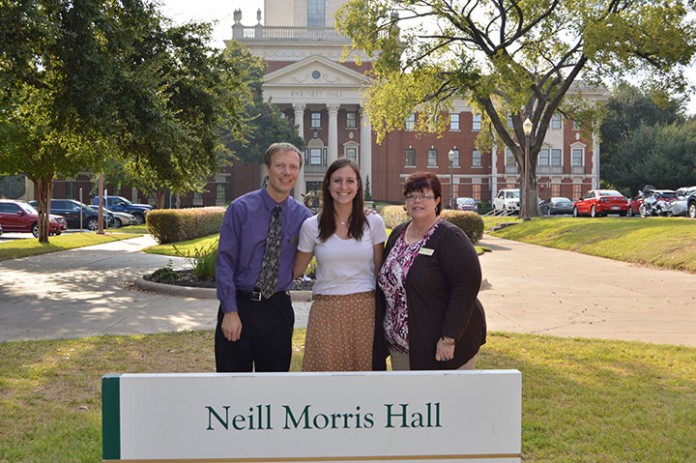
A trio from Baylor’s speech pathology department is starting a speech impediment support group to encourage stutterers.
The Baylor University Speech, Language and Hearing Clinic Stuttering Support Group will have its first meeting at 6 p.m. Thursday in 123 Neill Morris Hall.
One of the Baylor professors who helped plan the group has a stutter himself.
“At least with me, we know at every single meeting there will be one person who stutters,” said Dr. Paul Blanchet, associate professor of communication sciences and disorders in the College of Health and Human Sciences.
“I’m anxious to see what happens with this group. I anticipate it growing,” said Deborah Rainer, senior lecturer and clinical director of communication sciences and disorders. “We’re hoping that we don’t have enough space in the room on the first night.”
The support group was Rainer’s idea, according to Blanchet. The two of them have been working with graduate student Cayla Weber to get the group off the ground and spread the word.
“It has a very long title at this point: the Baylor University Speech, Language and Hearing Clinic Stuttering Support Group…” Blanchet said. “That’s quite a — especially for someone who stutters — that’s quite a mouthful.”
The meetings will not serve as therapy, but will simply be a place to talk, learn and fellowship with other individuals who struggle with a stutter.
This first meeting will focus on the International Stuttering Awareness Day Online Conference, which is being held until International Stuttering Awareness Day on Oct. 22.
The conference features an “ask the expert” panel, where people can log on and ask questions about stuttering. Blanchet has been chosen as one of the 21 international experts on the panel.
Blanchet speaks from experience when he says that people who stutter often feel like they are the only ones. He said only about one percent of students stutter, which could mean only one student in an entire high school.
“I was always a fluency client in whatever school I was in,” said Blanchet, referring to his undergraduate and graduate studies. “I’ve spent, like, half of my life on one or the other sides of a therapy table.”
Weber said Blanchet’s experience will add to the support group.
“… It brings a whole other level to [classes] for him to have that personal experience and to have been there at a lot of those different [therapy] programs across the country,” Weber said.
He will bring that same experience and expertise to the support group meetings, where attendees are encouraged to use their own therapy techniques or to speak freely without worrying about someone correcting them.
Baylor students, community members and parents of children who stutter are all welcome to come to the meetings.
After the first meeting this Thursday, meetings will occur on the first Thursday of every month beginning in October.
The Baylor Speech, Language and Hearing Clinic is open Monday through Thursday from 8 a.m. to 5 p.m. by appointment.
Rainer said evaluations and treatment are free for students who think they may need speech or hearing therapy.
“We have a really good clinical reputation, as well as academic,” Rainer said.
The clinic also sees patients from the community and offers a range of services, working with lisps and stutters, vocal cord abuse, articulation, understanding and expression of language, hearing impairments, traumatic brain injuries, impairments due to strokes and even social therapy. Visit www.baylor.edu/csd for more information.





